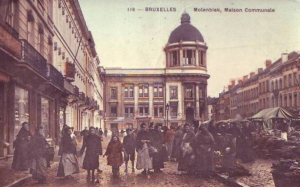Molenbeek’s problems are not new and they show up dysfunction of Belgian state
Tim King, Politico’s Brussels sketchwriter, offers an interesting reflection on Molenbeek, the suburb that has become the focus of the investigation into the November 13 Paris attacks.
News that Molenbeek was implicated “didn’t shock many of us who live in the Belgian capital,” he wrote, describing the range of emotions felt by residents and radio stations: “Indignation, sorrow, anger, guilt, despair, defiance. But not surprise.”
There you go then. Presumably Belgium has had a bad feeling about Molenbeek for a long time. In the past two years, people with ties to Molenbeek have repeatedly come up on the counter-terrorism radar, mostly after the fact. Last year, Molenbeek was in the spotlight for the shooting at the Jewish museum in Brussels, the Charlie Hebdo attacks in January and August’s failed attack in a train headed for Paris.
In this context, Mr King makes an important point: “Long before the emergence of jihadism, Molenbeek had acquired a reputation for lawlessness.”
The locality’s high levels of petty crime – muggings, drug dealing and burglaries – speaks volumes about “the the deep dysfunction in the Belgian state”, he writes.
It may be politically convenient to blame elements of the Belgian political establishment, Molenbeek’s former Socialist mayor Philippe Moureaux, for example. Or some radical mosques, as the Belgian Prime Minister Charles Michel recently said. But, the conclusions are inescapable, as Mr King points out.
“What is remarkable about Molenbeek is the proximity of the poverty and lawlessness to the center of a European capital city, including the political and cultural institutions of the Brussels, Flemish and national governments.
“Molenbeek fits the American pattern in that it is an area blighted by derelict industrial buildings and is on ‘the wrong side of the tracks’, which in this case means the wrong side of the canal that splits Brussels into east and west.”
He compares the challenge posed by Molenbeek to that of Brixton, just three miles away from the heart of political power in London. It’s not like the South Bronx or Glasgow, he says. The failures in Molenbeek are multi-sectoral: of politics and government, justice, fiscal and economic. And he quotes a 1998 essay Où va la Belgique? (Whither Belgium?) by academics Kris Deschouwer and Lieven De Winter. They point out that the Belgian state has always suffered problems of political legitimacy. And linguistic tensions were exacerbated by the consequences of the industrial revolution and subsequent de-industrialization.
Belgium was the second European country after Britain to undergo a 19th century industrial revolution and its need for resources and manpower created the migration patterns that mark it out today. As well as the problems.


